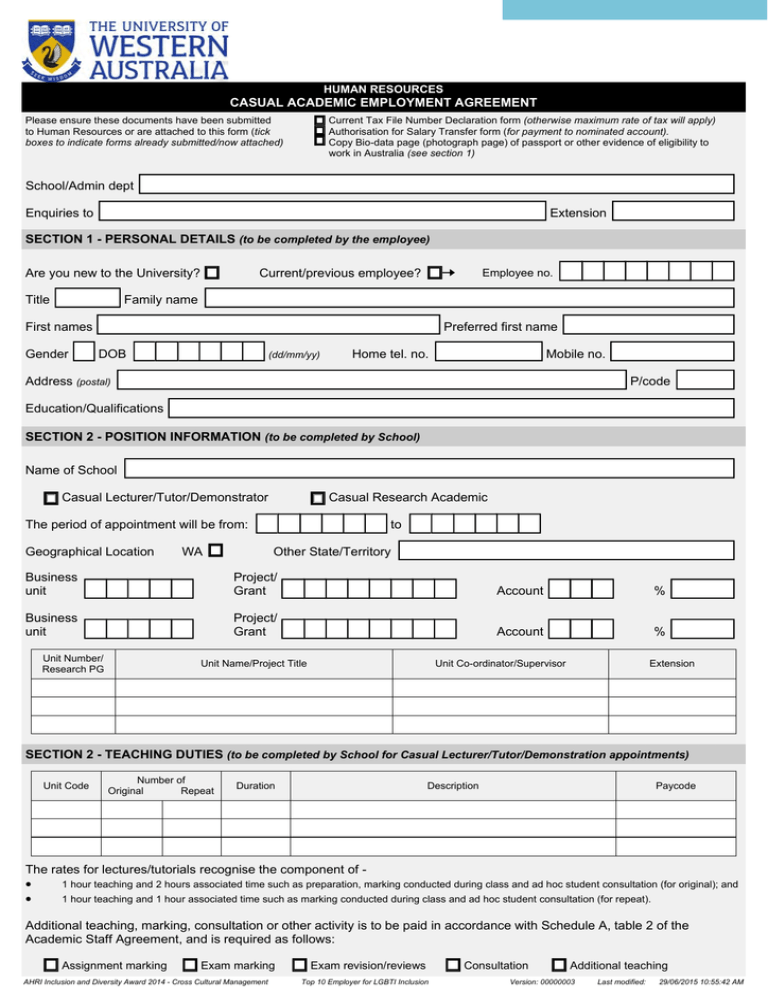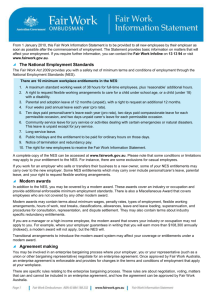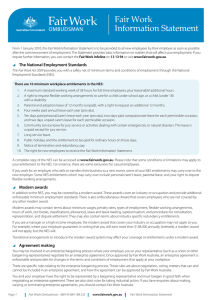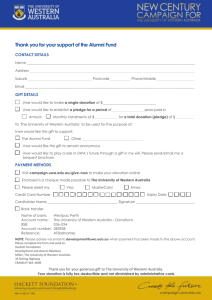The rates for lectures/tutorials recognise the component of
advertisement

HUMAN RESOURCES CASUAL ACADEMIC EMPLOYMENT AGREEMENT Please ensure these documents have been submitted to Human Resources or are attached to this form (tick boxes to indicate forms already submitted/now attached) Current Tax File Number Declaration form (otherwise maximum rate of tax will apply) Authorisation for Salary Transfer form (for payment to nominated account). Copy Bio-data page (photograph page) of passport or other evidence of eligibility to work in Australia (see section 1) School/Admin dept Enquiries to Extension SECTION 1 - PERSONAL DETAILS (to be completed by the employee) Are you new to the University? Title Current/previous employee? Employee no. Family name First names Gender Preferred first name DOB (dd/mm/yy) Home tel. no. Mobile no. P/code Address (postal) Education/Qualifications SECTION 2 - POSITION INFORMATION (to be completed by School) Name of School Casual Lecturer/Tutor/Demonstrator Casual Research Academic The period of appointment will be from: Geographical Location WA to Other State/Territory Business unit Project/ Grant Account % Business unit Project/ Grant Account % Unit Number/ Research PG Unit Name/Project Title Unit Co-ordinator/Supervisor Extension SECTION 2 - TEACHING DUTIES (to be completed by School for Casual Lecturer/Tutor/Demonstration appointments) Unit Code Number of Original Repeat Duration Description Paycode The rates for lectures/tutorials recognise the component of 1 hour teaching and 2 hours associated time such as preparation, marking conducted during class and ad hoc student consultation (for original); and 1 hour teaching and 1 hour associated time such as marking conducted during class and ad hoc student consultation (for repeat). Additional teaching, marking, consultation or other activity is to be paid in accordance with Schedule A, table 2 of the Academic Staff Agreement, and is required as follows: Assignment marking Exam marking AHRI Inclusion and Diversity Award 2014 - Cross Cultural Management Exam revision/reviews Top 10 Employer for LGBTI Inclusion Consultation Additional teaching Version: 00000003 Last modified: 29/06/2015 10:55:42 AM HUMAN RESOURCES CASUAL ACADEMIC EMPLOYMENT AGREEMENT (page 2) SECTION 3 - RESEARCH DUTIES (to be completed by School for Casual Research appointments) Estimated hours for period of employment Paycode (730, 734 or 734A) Description SECTION 4 - PERSONAL DETAILS (to be completed by the employee) Evidence of Eligibility to work in Australia Please provide evidence of your eligibility to work in Australia. Acceptable forms of evidence include: If an Australian citizen 1. Australian passport (certified copy of photograph page); 2. Australian citizenship certificate or certificate of evidence of Australian citizenship plus another form of photo identification such as a driver’s licence; or 3. If none of the above are available and you were born in Australia before 20 August 1986 – Australian birth certificate plus another form of photo identification such as a driver’s licence; 4. If none of the above are available and you were born in Australia on or after 20 August 1986 – Australian birth certificate showing that at least one parent was an Australian citizen or permanent resident at the time of birth plus another form of photo identification such as a driver’s licence. If not an Australian citizen 1. Present original of passport or send certified copy to Human Resources as proof of identification and give consent to HR Services to check your visa details through the Visa Entitlement Verification Online (VEVO); or 2. Provide a certified copy of any visa approval paperwork received from the Department of Immigration and Border Protection. 3. Please note: Primary student visa holders with an 8105 Work Limitation are required to provide evidence that they have commenced their course of study or training before they can commence work. Evidence can include a Confirmation of Enrolment or a letter from their relevant education provider. Are you a scholarship holder at UWA? No Yes Do you have any other teaching commitments at UWA this semester? If yes, you must not work more than 8 hours per week during normal working hours (excepting semester breaks) No Yes Name of School Emergency Contact Details Name Address Relationship Contact No Hours per week HUMAN RESOURCES CASUAL ACADEMIC EMPLOYMENT AGREEMENT (page 3) SECTION 5 - DECLARATION Ability to perform the requirements of the position As an employee you have the occupational health and safety responsibilities to not place yourself or others at risk of injury or harm. This means that you must inform your supervisor throughout the course of your employment of any health matter or injury that may, or will likely affect your ability to perform the requirements of the position (also referred to as inherent requirements of the position). The University promotes the provision of assistance, aids and equipment (reasonable adjustments) to employees who require these to perform their duties. You are required to advise your supervisor/manager promptly if you require adjustments on account of illness, injury or disability, at any time during your employment. For further advice regarding employee and employer rights and obligations around reasonable adjustments contact Equity and Diversity Services (telephone 6488 3873). For advice on modification to duties or equipment provision, contact the Manager, Injury Management and Wellbeing from Safety, Health and Wellbeing (telephone 6488 2784). To help identify staff that require adjustments in their workplace and ensure that these are provided, please answer the following questions by ticking the relevant box. 1. Do you have a medical condition, disability or any impairment for which you require adjustment/s in order to perform the inherent requirements of the position? Yes No If you have indicated that you require adjustments, an Occupational Therapist from Safety, Health and Wellbeing will contact you to discuss your needs. 2a. Are you currently, or have you at any time within the last five (5) years, been in receipt of payments/damages arising from a workers’ compensation claim; third party insurance claim (such as a motor vehicle accident claim); disability claim for sickness, incapacity, disability, injury or impairment; or from any salary continuance insurance claim (or similar)? Yes No 2b. Is the claim currently open or the benefit continuing? Yes No History of a prior claim will not in itself preclude appointment to the position. Under section 79 of the Workers’ Compensation and Injury Management Act, if at any time when seeking or entering into employment a person wilfully or falsely represents themselves as not having previously suffered from a disability which is the subject of a subsequent claim, a dispute resolution body may, in its discretion, refuse to award compensation. If the University has concerns about your ability to perform the inherent requirements of the position during your employment, it may direct you to attend a review by a medical practitioner, medical specialist or allied health professional. HUMAN RESOURCES CASUAL ACADEMIC EMPLOYMENT AGREEMENT (page 4) SECTION 6 - AGREEMENT I accept the terms of the Casual Teaching Employment Agreement (CTEA) and agree to comply with the terms and conditions of the relevant Staff Agreement. The rates for lectures/tutorials recognise the component of teaching and associated time such as preparation and marking conducted during the lecture/tutorial. Please note as the number of students enrolled in the unit may fluctuate, it is possible that my appointment may be subject to variation or cancellation any time during the semester. Notice: I understand that as the number of students enrolled in the unit may fluctuate, it is possible that my appointment may be subject to variation or cancellation any time during the semester. This contract may be terminated by one day’s notice on either side given in writing on any day or by the payment in lieu of that day. I understand that the UWA Code of Ethics and Code of Conduct (http://www.hr.uwa.edu.au/publications/code_of_ethics) details the University’s expectations for the behaviour of all staff, including staff on casual contracts. I understand it is my responsibility to acquaint myself with the codes of behaviour expected of me while employed at the University. I confirm that my total appointment(s) with the University does not total > 1.0 FTE I confirm that I will complete the Online Induction (http://www.catl.uwa.edu.au/resources/tl_orientation/casual_induction) training requirement within 1 month of commencing. I confirm that I will complete the Occupational Health and Safety On-Line Induction within 1 month of commencing as a new staff member. I have completed the Declaration (page 3) and understand the inherent requirements of the role. If illness or any other circumstance prevents me from performing a particular teaching or research activity, I am required to advise the Unit Co-ordinator/ Supervisor. I understand that as required under the Government's Superannuation Guarantee Charge legislation, the University will pay employer superannuation contributions on all earnings. The contributions are paid to the UniSuper Plan as required under the University of Western Australia Staff Agreements. i. ii. iii. I declare that: I have answered all questions honestly. To the best of my knowledge I am able to fulfil the inherent requirements of the position, or I will be able to fulfil the inherent requirements with the provision of reasonable adjustments. I understand that incorrect or misleading statements or omissions may render me liable for termination of my employment or disciplinary action and/or negate any future claim for compensable injury or illness. I authorise any medical practitioner, medical specialist or allied health practitioner that the University directs me to attend to provide information to the University, to enable it to determine: i. Whether I am capable of fulfilling the inherent requirements of the position for which I have been appointed; and/or ii. To identify reasonable adjustments that the University can provide to enable me to fulfil the inherent requirements of the position. Employee signature Date (dd/mm/yy) Employee name (please print) SECTION 7 - APPROVAL A. a. b. c. d. B. a. b. c. d. e. UNIT CO-ORDINATOR/SUPERVISOR (if not the Approved Delegate) I confirm that: The inherent requirements of the role have been explained to the appointee. The Online Induction training requirement has been explained and I agree to ensure the training is undertaken within 1 month of commencement. The appointee understands the requirement to read UWA Code of Ethics and Code of Conduct I acknowledge the requirement to meet with this employee at least 3 times during the period of this employment agreement. Name of Unit Co-ordinator/Supervisor (please print) Signature Contact Number/Extension Date (dd/mm/yy) APPROVED DELEGATE I approve the above and certify that: This appointment is a true casual appointment Sufficient funds are available in the account/s stated to cover the appointment The details in Sections 1 & 2 are correct The applicable rate of pay is that prescribed under the Academic Agreement Casual Teaching Schedule (http://www.hr.uwa.edu.au/hr/salary_scales/casual_teaching_rate) The appointee has been provided with a copy of the Fair Work Information statement (pages 5 & 6) Name of Approved Delegate (See HR Delegations) (please print) Signature Contact Number/Extension Date (dd/mm/yy) HUMAN RESOURCES CASUAL ACADEMIC EMPLOYMENT AGREEMENT (page 5) Useful HR Websites at UWA (to be retained by employee) HR Homepage: www.hr.uwa.edu.au Every employee at UWA is allocated a unique 8 digit employee number on the University’s Human Resources Information System (Alesco). This remains the same no matter how many times the employee leaves and returns to the University, however different job numbers may be allocated. To obtain your employee number, please contact your School Administrative Officer, School Manager or Human Resources. Employee Self Service (ESS): www.hr.uwa.edu.au/ess ESS Website: www.hr.uwa.edu.au/ess First Login: use your eight (8) digit employee number and your initial password is your six (6) digit date of birth—ddmmyy format. View and update various personal details: Your home address, postal address, emergency contact details, email address, internal mailbag delivery address, qualifications, employee demographics View your payroll details: View your payslips, update your bank account details, update your current deductions, choose your payment summary delivery method and view & print your payment summary Inductions: www.hr.uwa.edu.au/working/new-staff/induction Conditions of Employment: www.hr.uwa.edu.au/page/95944 Superannuation: www.hr.uwa.edu.au/policies/policies/pay/employee-benefits/superannuation Equity & Diversity: www.equity.uwa.edu.au Safety, Health and Wellbeing: www.safety.uwa.edu.au Staff Contact Directory: directory.uwa.edu.au Fair Work Information Statement From 1 January 2010, this Fair Work Information Statement is to be provided to all new employees by their employer as soon as possible after the commencement of employment. The Statement provides basic information on matters that will affect your employment. If you require further information, you can contact the Fair Work Infoline on 13 13 94 or visit www.fairwork.gov.au. The National Employment Standards The Fair Work Act 2009 provides you with a safety net of minimum terms and conditions of employment through the National Employment Standards (NES). There are 10 minimum workplace entitlements in the NES: 1. 2. 3. 4. 5. 6. 7. 8. 9. 10. A maximum standard working week of 38 hours for full-time employees, plus ‘reasonable’ additional hours. A right to request flexible working arrangements to care for a child under school age, or a child (under 18) with a disability. Parental and adoption leave of 12 months (unpaid), with a right to request an additional 12 months. Four weeks paid annual leave each year (pro rata). Ten days paid personal/carer’s leave each year (pro rata), two days paid compassionate leave for each permissible occasion, and two days unpaid carer’s leave for each permissible occasion. Community service leave for jury service or activities dealing with certain emergencies or natural disasters. This leave is unpaid except for jury service. Long service leave. Public holidays and the entitlement to be paid for ordinary hours on those days. Notice of termination and redundancy pay. The right for new employees to receive the Fair Work Information Statement. A complete copy of the NES can be accessed at www.fairwork.gov.au. Please note that some conditions or limitations may apply to your entitlement to the NES. For instance, there are some exclusions for casual employees. If you work for an employer who sells or transfers their business to a new owner, some of your NES entitlements may carry over to the new employer. Some NES entitlements which may carry over include personal/carer’s leave, parental leave, and your right to request flexible working arrangements. Modern awards In addition to the NES, you may be covered by a modern award. These awards cover an industry or occupation and provide additional enforceable minimum employment standards. There is also a Miscellaneous Award that may cover employees not covered by any other modern award. Modern awards may contain terms about minimum wages, penalty rates, types of employment, flexible working arrangements, hours of work, rest breaks, classifications, allowances, leave and leave loading, superannuation, and procedures for consultation, representation, and dispute settlement. They may also contain terms about industry specific redundancy entitlements. If you are a manager or a high income employee, the modern award that covers your industry or occupation may not apply to you. For example, where your employer guarantees in writing that you will earn more than the high income threshold, currently set at $113,800 per annum and indexed annually, a modern award will not apply, but the NES will. Transitional arrangements to introduce the modern award system may affect your coverage or entitlements under a modern award. Agreement making You may be involved in an enterprise bargaining process where your employer, you or your representative (such as a union or other bargaining representative) negotiate for an enterprise agreement. Once approved by Fair Work Australia, an enterprise agreement is enforceable and provides for changes in the terms and conditions of employment that apply at your workplace. There are specific rules relating to the enterprise bargaining process. These rules are about negotiation, voting, matters that can and cannot be included in an enterprise agreement, and how the agreement can be approved by Fair Work Australia. You and your employer have the right to be represented by a bargaining representative and must bargain in good faith when negotiating an enterprise agreement. There are also strict rules for taking industrial action. If you have enquiries about making, varying, or terminating enterprise agreements, you should contact Fair Work Australia on 1300 799 675. Individual flexibility arrangements Your modern award or enterprise agreement must include a flexibility term. This term allows you and your employer to agree to an Individual Flexibility Arrangement (IFA), which varies the effect of certain terms of your modern award or enterprise agreement. IFAs are designed to meet the needs of both you and your employer. You cannot be forced to make an IFA, however, if you choose to make an IFA, you must be better off overall. IFAs are to be in writing, and if you are under 18 years of age, your IFA must also be signed by your parent or guardian. Freedom of association and workplace rights (general protections) The law not only provides you with rights, it ensures you can enforce them. It is unlawful for your employer to take adverse action against you because you have a workplace right. Adverse action could include dismissing you, refusing to employ you, negatively altering your position, or treating you differently for discriminatory reasons. Some of your workplace rights include the right to freedom of association (including the right to become or not to become a member of a union), and the right to be free from unlawful discrimination, undue influence and pressure. If you have experienced adverse action by your employer, you can seek assistance from the Fair Work Ombudsman or Fair Work Australia (applications relating to general protections where you have been dismissed must be lodged with Fair Work Australia within 60 days). Termination of employment Termination of employment can occur for a number of reasons, including redundancy, resignation and dismissal. When your employment relationship ends, you are entitled to receive any outstanding employment entitlements. This may include outstanding wages, payment in lieu of notice, payment for accrued annual leave and long service leave, and any applicable redundancy payments. Your employer should not dismiss you in a manner that is ‘harsh, unjust or unreasonable’. If this occurs, this may constitute unfair dismissal and you may be eligible to make an application to Fair Work Australia for assistance. It is important to note that applications must be lodged within 14 days of dismissal. Special provisions apply to small businesses, including the Small Business Fair Dismissal Code. For further information on this code, please visit www.fairwork.gov.au. Right of entry Right of entry refers to the rights and obligations of permit holders (generally a union official) to enter work premises. A permit holder must have a valid and current entry permit from Fair Work Australia and, generally, must provide 24 hours notice of their intention to enter the premises. Entry may be for discussion purposes, or to investigate suspected contraventions of workplace laws that affect a member of the permit holder’s organisation or occupational health and safety matters. A permit holder can inspect or copy certain documents, however, strict privacy restrictions apply to the permit holder, their organisation, and your employer. The Fair Work Ombudsman and Fair Work Australia The Fair Work Ombudsman is an independent statutory agency created under the Fair Work Act 2009, and is responsible for promoting harmonious, productive and cooperative Australian workplaces. The Fair Work Ombudsman educates employers and employees about workplace rights and obligations to ensure compliance with workplace laws. Where appropriate, the Fair Work Ombudsman will commence proceedings against employers, employees, and/or their representatives who breach workplace laws. If you require further information from the Fair Work Ombudsman, you can contact the Fair Work Infoline on 13 13 94 or visit www.fairwork.gov.au. Fair Work Australia is the national workplace relations tribunal established under the Fair Work Act 2009. Fair Work Australia is an independent body with the authority to carry out a range of functions relating to the safety net of minimum wages and employment conditions, enterprise bargaining, industrial action, dispute resolution, termination of employment, and other workplace matters. If you require further information, you can contact Fair Work Australia on 1300 799 675 or visit www.fwa.gov.au. The Fair Work Information Statement is prepared and published by the Fair Work Ombudsman in accordance with section 124 of the Fair Work Act 2009. © Copyright Fair Work Ombudsman. Last updated: July 2010.



